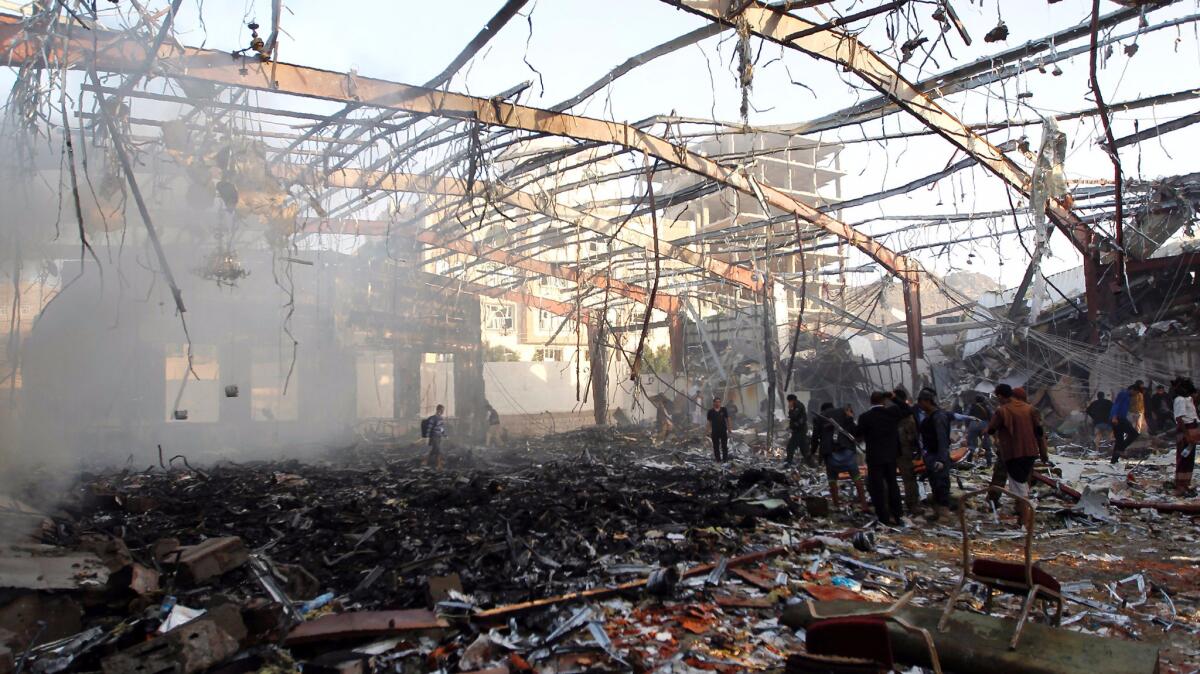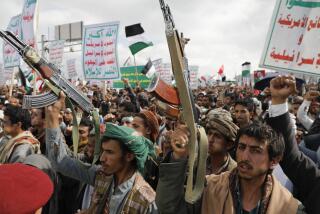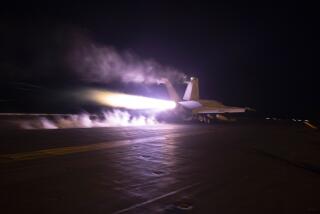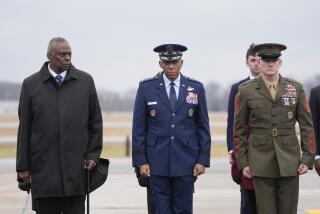Saudi-led coalition blames ‘wrong information’ for funeral bombing in Yemen

A Saudi-led coalition on Saturday blamed “wrong information” for the bombing last weekend of a packed funeral hall in the rebel-held Yemeni capital that killed at least 140 people and wounded about 600.
The coalition’s Joint Incidents Assessment Team, or JIAT, said a “party” affiliated with Yemen’s General Chief of Staff headquarters had provided intelligence that the hall in Sana was filled with leaders of the Shiite Houthi rebels, whom the coalition has been targeting since March 2015, when it intervened in Yemen’s civil war in support of the internationally recognized government.
The unidentified party insisted the site was “a legitimate military target,” the English-language statement said. The Air Operation Center in Yemen then directed a “close air support mission” to target the site without approval from the coalition’s command.
The investigators called on the coalition to immediately review the rules of engagement and recommended that compensation be offered to the victims’ families.
“JIAT has found that because of noncompliance with coalition rules of engagement and procedures, and the issuing of incorrect information, a coalition aircraft wrongly targeted the location, resulting in civilian deaths and injuries,” it said.
The coalition, which had initially denied any responsibility, said it accepts the results of the investigation and has started to implement the recommended changes.
“The coalition command expresses its regret at this unintentional incident and the ensuing pain for victims’ families,” it said in a statement.
The government of Yemeni President Abdu Rabu Mansour Hadi has yet to publicly comment on the Oct. 8 bombing. Yemen’s chief of staff is Maj. Gen. Mohammed Ali Maqdishi, a close ally of the powerful army Gen. Ali Mohsen Ahmar, now serving as vice president. Ahmar is also a top ally of Yemen’s Muslim Brotherhood, which is fighting the Houthis alongside government troops.
Mansour Ahmed Mansour, the spokesman for the investigators, told Associated Press by phone from Riyadh, Saudi Arabia’s capital, that “certain individuals” in the operations center had insisted on the strike.
“If the coalition was notified and given a chance to review the no-target list, it would have found out that the hall is among the facilities that enjoy protection from airstrikes,” he said. But, he added, “there was very, very strong insistence to carry out the attack within a specific frame of time and quickly, which gave no window for the coalition to review the orders.”
“The people who were inside the air operation center are the ones we hold responsible. They should be held accountable,” he said.
The investigative team, which includes 13 representatives from different members of the coalition, has investigated eight airstrikes that killed civilians. It has recognized one, on a residential compound in the port city of Mukha last year, as a mistake, blaming it on bad intelligence and vowing to compensate the victims. That attack killed and wounded scores of people. Mansour, the spokesman, said a new report on other incidents will be released soon.
The U.S.-backed coalition, which views the Houthis as an Iranian proxy, had come under mounting pressure to investigate the funeral hall bombing. Human Rights Watch said Thursday that the attack constitutes an apparent war crime and that remnants of a U.S.-made bomb were found at the scene.
Along with arms, the United States provides the coalition with logistical support and midair refueling. The White House has said it will immediately review its assistance to the Saudi-led coalition, explaining that such assistance was not a “blank check.”
Over the last year, coalition warplanes have bombed busy markets, weddings, schools and hospitals, killing hundreds of people and wounding thousands.
On Saturday, airstrikes targeting a general allied with the Houthis killed him and seven of his aides in the port city of Hudaydah, according to Yemeni security and military officials, who spoke on condition of anonymity because they were not authorized to brief the media.
The strikes targeted their command center, toppling the building and leaving others trapped beneath the rubble.
The deadly airstrikes on the funeral triggered a wave of counterattacks against U.S. and Saudi targets.
A U.S. Navy destroyer deployed in international waters in the Red Sea off the coast of Yemen came under attack twice in recent days from areas under Houthi control. In response, the U.S. destroyed three radar installations in Houthi-controlled ports near the strait of Bab al Mandab on Thursday, in the first direct U.S. involvement in Yemen’s war.
More to Read
Start your day right
Sign up for Essential California for news, features and recommendations from the L.A. Times and beyond in your inbox six days a week.
You may occasionally receive promotional content from the Los Angeles Times.






